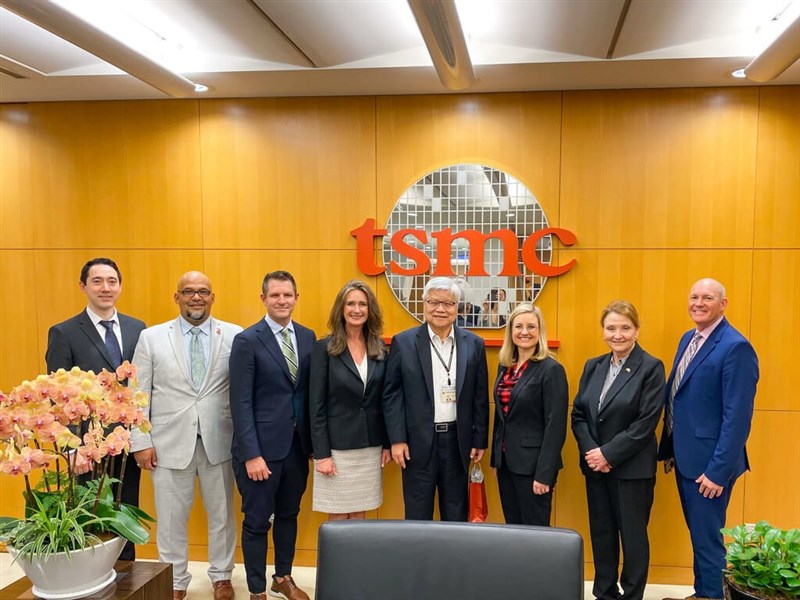Business To activate the text-to-speech service, please first agree to the privacy policy below.

Taipei, July 15 (CNA) Green energy developers in Taiwan are expected to make new investments in Phoenix, following in the footsteps of contract chipmaker Taiwan Semiconductor Manufacturing Co. (TSMC), according to a major business group in the American city.
During a recent three-day business trip to Taiwan, Chris Camacho, president and CEO of the Greater Phoenix Economic Council (GPEC), told CNA that he and his delegation had met with TSMC executives, as well as with representatives of electric vehicle, battery and energy storage companies to discuss possible Taiwanese investments in Phoenix, Arizona.
“TSMC was the catalyst that has now opened the door for dozens of other conversations that we’re having with leading (Taiwanese) companies in electric vehicles and batteries and smart technology,” said Camacho, whose 30-member delegation arrived on July 8 and also included included Phoenix Mayor Kate Gallego.
TSMC, the world’s largest contract chipmaker, is investing US$40 billion in Phoenix, Arizona, to build two advanced wafer fabs. The first one is scheduled to begin mass production of chips on the 4 nanometer process in 2024, while the other will start commercial operations in 2026, producing the 3nm chips that are TSMC’s most advanced technology currently in mass production.
In Camacho’s interview with CNA, he declined to name the other potential Taiwanese investors in his city, citing non-disclosure agreements.
“Because there are quite a few of them we’re working with right now, that will be ready over the next six months,” Camacho said, referring to the investment announcements, which he said would be made in the first quarter of 2024.
He touted the development of the electric vehicle environment in Arizona, saying that the U.S. Federal Government has provided the state with grants of US$76.50 million to build its EV charging infrastructure.
According to Camacho, there are currently about 20 million EVs on the road in the U.S., and the figure is expected to top 30 million over the next few years, with Arizona being one of the fastest growing EV markets in the country.
Taiwanese companies should feed into the EV supply chain in the U.S. by taking advantage of the Inflation Reduction Act (IRA), which is expected to spur American consumers to use EVs and can create tremendous business opportunities for Taiwanese investors, Camacho said.
“Whether it’s servicing these products from Taiwan, or making manufacturing investments in Arizona, that would make them competitive for the U.S. market, because of the IRA,” he said, referring to the Act that was signed in law last year by U.S. President Joe Biden to take on climate change and consumer costs and to help drive the global clean energy economy.
Taiwan, meanwhile, has a strong contract manufacturing capacity in electronics, and soon, non-semiconductor companies are expected to announce investments in Arizona, “which would be really exciting,” Camacho said.
In addition, over the past few years, Phoenix and Taiwan have been in discussions about direct flights, he said.
The “top airlines” in Taiwan may have an interest in direct flight services between the two points, he said, expressing the hope that one of the major carriers will launch not only direct commercial passenger flights but also cargo services, to boost bilateral trade and the tourism industry between Taiwan and Arizona.
Commercial air connectivity will allow Arizonans to enjoy attractions in Taiwan such as the convenient high speed rail system and beautiful beaches, he said, noting that many Taiwanese who travel to Arizona tend favor tourist attractions like the Grand Canyon.
Meanwhile, the Phoenix delegation, during its recent meeting with TSMC CEO C.C. Wei (魏哲家), promised to provide the chipmaker with whatever assistance it might need to complete its first wafer fab in the U.S. city on schedule.
The GPEC has been named as one of the top economic development organizations in the U.S. by non-profit International Economic Development Council (IEDC), which serves economic developers.
On its website, the GPEC said it has fueled the regional economy over the past 33 years by helping 950 companies, creating more than 174,000 jobs and facilitating US$36 billion in capital investments.

